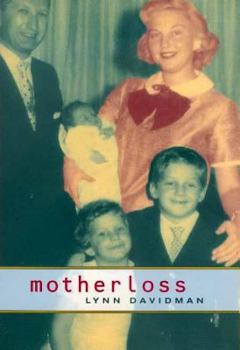Motherloss
Select Format
Select Condition 
Book Overview
Lynn Davidman's pathbreaking study analyzes the immediate and continuing impact of a mother's premature death on the children she leaves behind. Drawing on interviews with sixty adults from a variety... This description may be from another edition of this product.
Format:Hardcover
Language:English
ISBN:0520223195
ISBN13:9780520223196
Release Date:April 2000
Publisher:University of California Press
Length:293 Pages
Weight:1.40 lbs.
Dimensions:1.2" x 6.4" x 9.3"
Customer Reviews
5 ratings
An important contribution to the sociology of loss
Published by Thriftbooks.com User , 16 years ago
Lynn Davidman's book provides a sensitive and nuanced account of how mother loss reverberates throughout the course of people's lives in complex ways. As a fellow sociologist, I was touched by and learned from her deep and compassionate empathy for her subjects. She carefully and thoughtfully listened to their stories, and presents her analysis in a strikingly original way that honored the integrity of the narratives. This book helped me think about loss, identity, narrative and the art of sociological writing in new ways. I also know that her work has helped many individuals to make better sense of their own experiences of mother loss, something that few sociology books can claim.
motherloss
Published by Thriftbooks.com User , 24 years ago
I was impressed with the diversity of people interviewed. A central theme for most of the interviewees was how little disclosure of their mother's illness was given to them before or even after death. I was happy to see that children of the mothers who died in the 1980s and 90's were made more aware of their family situations. This book gives permission for those of us who have lost our mothers to open up the emotional attic and relive the memories that we all too often bury in our day to day lives.
The Art of Storytelling and Meaning Making
Published by Thriftbooks.com User , 24 years ago
What is perhaps most impressive about this high-achieving book is the wide audience to which it appeals. On one hand, Davidman is a masterful storyteller, weaving her own story of loss with the poignant and remarkable stories of her respondents. She is sensitive and incisive and expertly is able to represent the broad array of experiences with motherloss that she encountered during her fieldwork. This book is also a superb example of what sociology can be. Far from crunching numbers or stating hackneyed conclusions, Davidman offers a work of qualitative sociology replete with thick analysis and an understanding of the complexities and contradictions of the lives we live. She offers a fresh perspective on the role of the sociologist that, I hope, will inform sociologists in years to come.Her writing is lucid and engaging and carries the reader through many painful stories about motherloss and the aftermath of what she terms the loss of caring. Her steady voice and astute analysis demystifies the often silenced and unspoken tragedy of losing a parent at a young, formative age. There are few people--in the academy and outside of it--who I can think of who would not grow and learn from this book.
It helps to get it out in the open
Published by Thriftbooks.com User , 24 years ago
When I was fifteen, my mother died of cancer. This book is the first one I have found that has helped me make sense of this experience. My mother's cancer was not openly discussed in our family and we did not talk about my mother much after she died. But her death made a huge impact on my family;we were kind of lost without her. And for most of my life I have not talked very much about this. But reading this book and seeing the experiences of the people Davidman interviewed, helped me see how common our family's experiences were. It was helpful to learn about how society and the mother's role in it, and the American taboo on death, shaped our very personal, painful experiences of loss. I recommend this book to anyone who has lost a mother at any age. I'm sure you will find comfort in it.
Read Motherloss!
Published by Thriftbooks.com User , 24 years ago
This is one of the most powerful qualitative studies I have ever read. I found it emotionally hard to read. I had to put it down frequently because the emotions in the narratives flooded me at times. But the interpretations and the framework that set them up allowed me to read the narratives with an understanding that went outside of myself, which I think was particularly critical for me as a reader who has not shared the experience of the death of my mother. The book also manages to convey some very rich theory without diminishing the narratives and the integrity of the respondents. I loved that about the book. I also was very impressed with the methodological discussions--they answered many important questions about what it means to do fieldwork and particularly, to do fieldwork on a sensitive issue. Finally, the "voice" is perfect: the blend of personal and scholarly that allows the reader in. This is such a rich and fine book. I am going to use it in my introduction to qualitative methodology classes and in my feminist research and scholarship class.Read this book!




